
1844 Micajah Pickett and Jane E. Clark were married on February 1 in Jackson County, Mississippi.
Mississippi Free Trader, Natchez, Mississippi, February 7, 1844. [8]
1812 Micajah Pickett was born on November 29 at Sicily Island, Catahoula Parish, Louisiana. [1] [2]
1833 Micajah Pickett of Mississippi was in the first class, at the School of Natural History at the University of Virginia. [3]
c 1835 Micajah Pickett of Meadville, Franklin County, Mississippi was named as a graduate of the University of Virginia with a degee in Natural Philosophy. [4]
1836 Nathan and James M and Micajah Pickett [perhaps sons of William Pickett and Mary King, but note one was James M, not James C Pickett] were early settlers in Webster Parish, Louisiana. [5]
The first entries in Township 19, Range 10, were made by Reuben Drake and John Bauskett on Section 1, John W. Hughes on Section 3, Nathan Pickett and William Ferriday on Section 7, 5 James Surget on Section 9, Solomon High and Emilius P. Bry on Section 15, Robert Davis on Section 17, James M. and Micajah Pickett on Section 20, Andrew Lawson and Peter G. Thompson on Section 26, Algernon S. Robertson on Section 29, Harrison Presnall, Duncan McDougall and John Stamps on Section 36, in 1836.
1841 Micajah Pickett was listed on the census for Yazoo County, Mississippi. Wm Pickett and Rufus King Pickett, perhaps brothers, were listed on the same page. [6] [7]

In Jackson, on the 1st inst., 1st inst., Micajah Pickett of Yazoo county, to Miss Jane E. Clark, daughter of Gen. Wm. Clark, of Hinds.
1844 Micajah Pickett and Jane Eliza Clark were married on February 3 in Jackson County, Mississippi. [9]
Jane Clark Pickett was the daughter of a wealthy plantation owner in Hinds and Madison Counties who had also served decades earlier as state treasurer and president of the board governing the state penitentary. In 1844 Jane married a wealthy planter, Micajah Pickett, who by 1860 owned a plantation and 181 enslaved persons near Benton in Yazoo County. During the war, Jane kept up a lively correspondence with her mother near Jackson and a sister in Madison County. From her letters, the difficult life of this plantation mistress unfolds clearly.
Much like other plantation owners, Jane actually had little hope of success even as the war began. In speaking of the future, she wrote, "I fear it is full of disaster and woe." She realized what many other plantation owners knew, that even if militarily successful, they ran the chance of losing out economically if the war came to their property.
Relatively few problems emerged prior to the major Federal invasion in mid-1863. There were some shortages on the plantation, as her description of Christmases at their home reveals: "Good ol Santa Clause did not forget his time honored mission," she wrote in 1861, "but stopped his car on the house roof, descended the chymney and spread a bountiful repast of candies, cakes, and oranges sprinkled with evergreen on the stand. A handsome bracelet in boxes for each delighted their gaze." The next year, December 1862, Santa came again. The war had not stopped Saint Nick, although the fare was not as great as usual due to the blockade.
Meanwhile, Jane worked to support the Confederacy. She sent one brother to the cause, although her husband, as a wealthy planter, did not enroll. Jane did knit socks for the soldiers, however, telling her sister, "I am now on my seventeenth pair of socks for soldiers … I knit night and day." She was also busy consoling several local women who had lost husbands and fathers in the war. "Her sorrows were another picture of a widow[']s wailing & anguish," she wrote to her sister on one occasion. "I cannot describe it."
Suddenly, however, Jane's world changed. Because of the Federal invasion of central Mississippi and the capture of the capital, the Picketts packed up what they could, slaves and all, and headed east to safety. Her letters describe the fear she felt for her possessions left behind. "Oh! I cannot grasp the great events passing through our much loved country," she wrote in July 1863 from Montevallo, Alabama, where she had sought refuge while her husband was looking for a more secure place to live even farther east in Georgia. "The woe and desolation weeping all around us, we and many of our friends driven from homes, and which even now may lay in ashes," she wrote. "We received letters continually from the overseer, and Mr. Craig whose family is at our house, if it is still standing, until the fall of Viksburg; since then we have received none from them."
Jane's husband tried to return to their plantation after Vicksburg fell, but could not get any farther than Meridian. News was bad, however. Most of their slaves had run away. "The negroes in most instances refuse to leave with their masters, and in some cases they have left the plantations in a perfect stampede," she wrote to her sister, and described how many that they brought out had left and that others "will go to the Yankees, I suppose, when they can." Such events were hard on all, especially her husband, who, Jane said, "is most very unhappy, for the life of an exile suits him as you know, mother, less than almost any other man." But, she wrote, "for my part I bend to my destiny, and get along quite cheerfully."
She did, that is, until more bad reports arrived. "The news has just come that our house and Levoy King's has been burned down, and that all the negroes taken." She related that "Mr. Pickett cannot bear so large a loss of property," and stated that "if fortunes of war should threated me with degradation I am not compelled to live".
Eventually, more details of the events reached Jane, telling of "the sacking of our hoses on both places." The enemy "told negroes they were free & had a right to everything they saw; at that the negroes rushed into the house, and now the great effort was who could get the most." She went on to describe, "My libraries were robbed of their contents," and that the Yankee soldiers said "they had the greatest treat they had in Miss. in my pantry among cordials, wines, & preserves."
Despite later learning that their house was not actually burned, Jane was still convinced about the enemy's alleged evil. As she wrote, she was "not compelled to live." Such was the attitude of many Mississippi women. While they supported the war, they had second thoughts when it actually affected them personally. That did not necessarily mean that she would go over to the enemy, however; hatred of the Yankees was even more intense than earlier. So while Jane Pickett's letters describe a troublesome nomadic existence for a wealthy plantation family, they nevertheless also show the lessening of the will to continue amid a growing hatred of the enemy.
1847 Douglas S. King and Mariah E. King of Yazoo County, Mississippi sold land to Micajah Pickett, guardian of Livingston J.M.P. King a minor, and Mary King and Sarah Virginia King. The land was in section 4, township 13, Holmes County, Mississippi. The deed was dated February 22. [10]
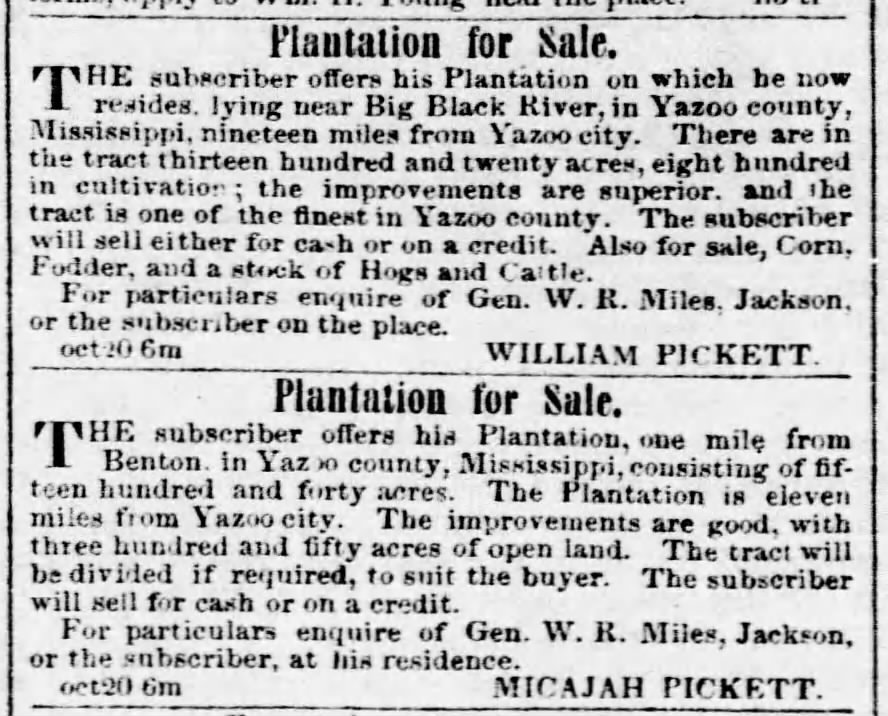
1850 Micajah Pickett (age 38, born in Louisiana) lived in Yazoo County, Mississippi, in a household with Jane E Pickett (age 35). [12] The household of James M. Pickett (age 30) and wife Susanna (age 30) was listed on the same page of the census (does not match the age or wife of either James C or James M, reported sons of this Micajah or of brother Isaiah Pickett).
1850 Micajah Pickett was listed, with 87 enslaved persons, on the slave schedule in Yazoo, Mississippi. [13]

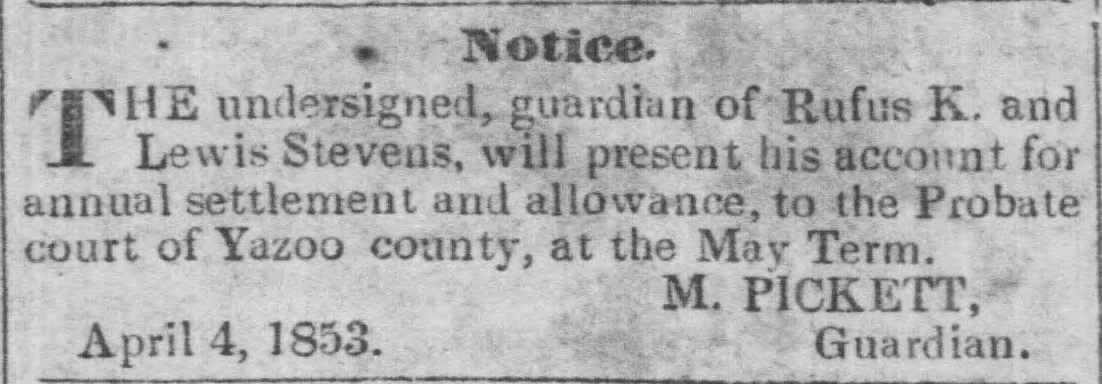
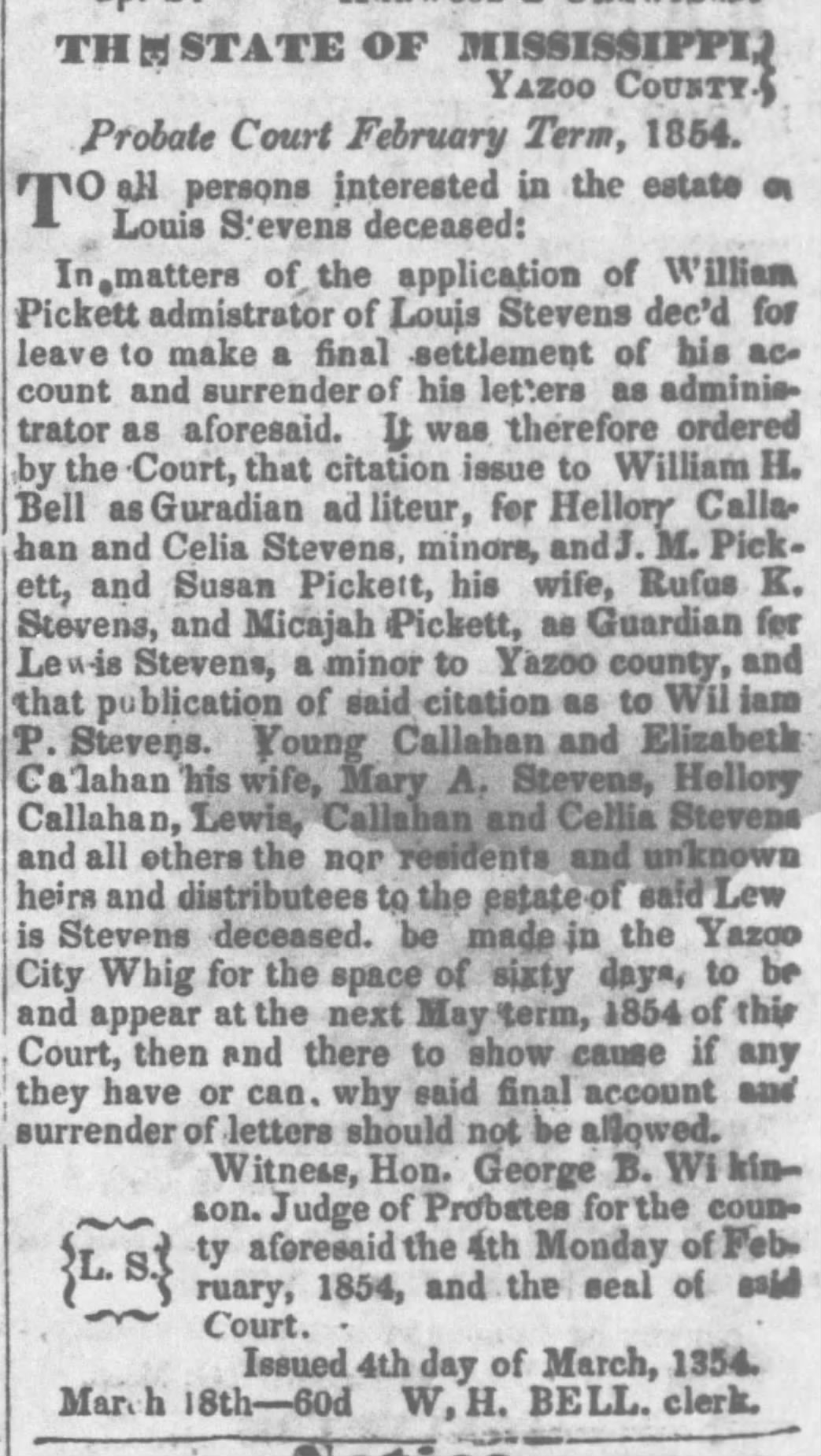
1854 Micajah Pickett, at that time a large and wealthy planter of the county, whose plantations were on Big Black, some 20 or 25 miles south-east of Yazoo City, built brick cabins on his place for servants. William A. Pickett, reportedly a son, tore them down in 1899 (one year after the death of Micajah). This (and the amnesty granted in 1866, cited below) suggests that, despite the fears expressed by Jane in her letters cited above, the couple kept their property near Yazoo after the war.

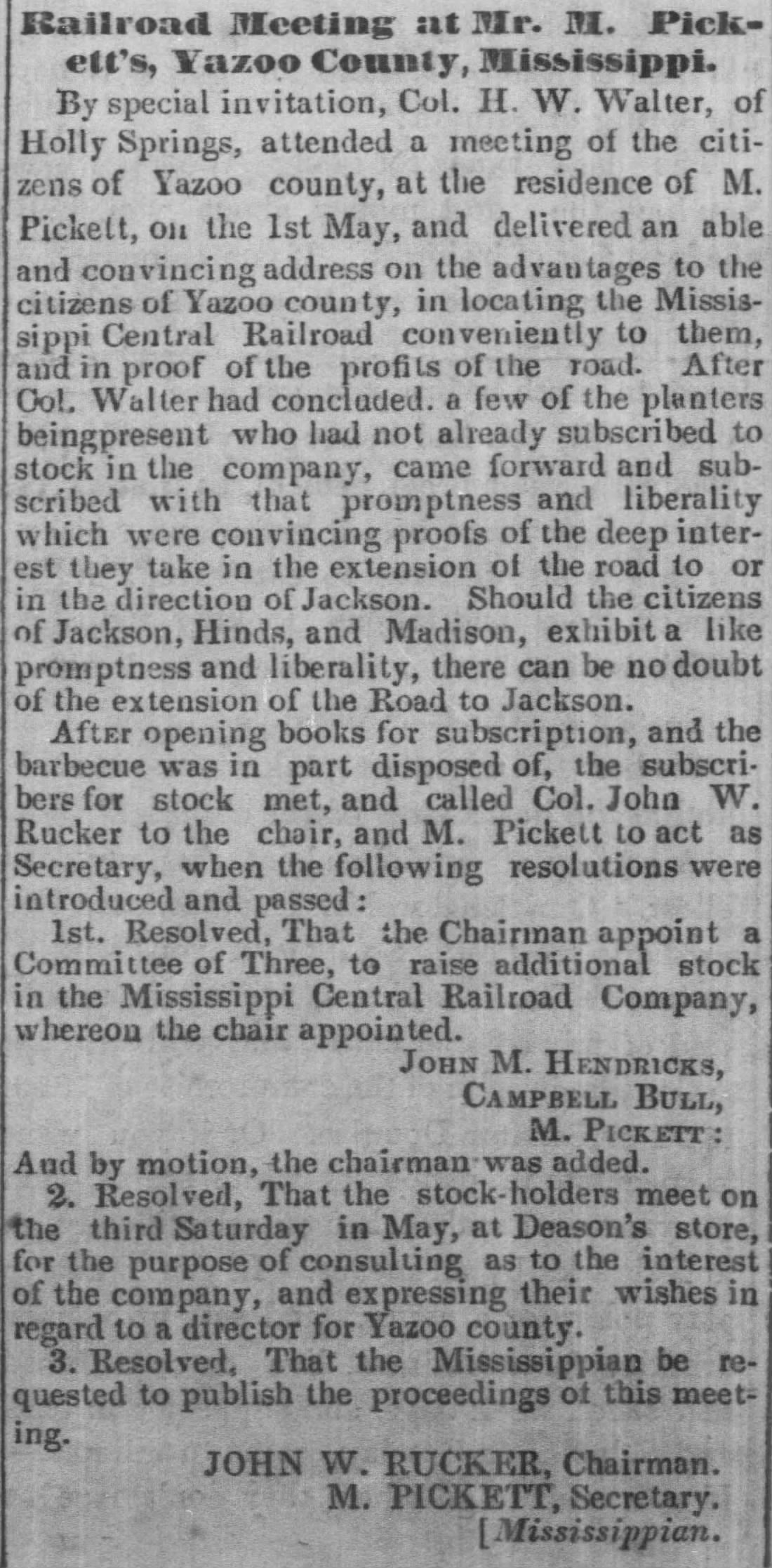
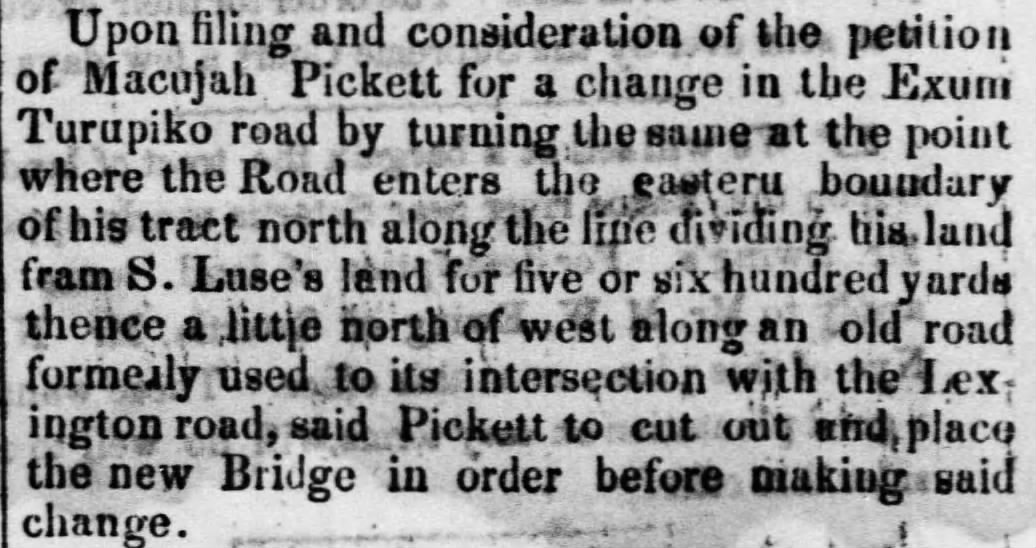
1860 M Pickett (age 47, born in Mississippi) lived in Yazoo County, Mississippi, in a household with Jane E Pickett (age 44), Jessie Kirpatrick (age 13), Lou Kirpatrick (age 11), L H Jones (age 26), M A Jones (age 21), A H Jones (age 2), J B Aikman (age 17), Lebbie Aikman (age 14), and W W Wilburne (age 45). M. Pickett was a planter. [21]
1865 Micajah Pickett, of Yazoo County, Mississippi, wrote a letter to President Andrew Johnson on July 13, to petition for amnesty and restoration of all rights of property except as to slaves. A pardon was granted on July 31, 1865. "Worth over $20,000". Micajah argued that since he did not serve in the Confederate army, he had not voluntarily participated in the rebellion. He stated that he had no sons living when the rebellion commenced and that "I find my fortune wrecked with a family for which to provide, and a part to educate.". [22]
1866 Mrs Jane E. Pickett, wife of Micajah Pickett, of Yazoo County, Mississippi, wrote a letter to President Andrew Johnson on February 28 to petition for amnesty. A pardon was granted on April 11, 1866. "Worth over $20,000". [23]
1867 Micajah Pickett (by order of the President), W.M. Pickett (by order of the President), and Mrs Jane E. Pickett (Governor Humphries), received pardons as "persons engaged in the late rebellion who have been pardoned" through exemption under amnesty proclamation of May 29, 1865. They were all of Mississippi. The listing indicated "Worth over $20,000". [24]
1870 Micajah Pickett (age 57, born in Louisiana) lived in District 3, Yazoo County, Mississippi, in a household with Jane C Pickett (53), L P Kilpatrick (18), and Wm H Hord (27). Micajah Pickett was a farmer. [25]
1878 Mrs. Jane E. Pickett, wife of Micjah Pickett, died on December 2 in Jackson County, Mississippi. [26]

1879 Jane Eliza Clark Pickett died on December 2 at Yazoo City, Yazoo County, Mississippi and was buried at Pickett Cemetery, Yazoo City, Yazoo County, Mississippi. Jane Eliza Clark Pickett was born on October 30, 1815. [28] [29]
Wife of Micajah King Pickett, son of William Pickett, son of Micajah Pickett.
1880 Micajah Pickitt (age 67, born in Louisiana) lived in Deasonville, Yazoo County, Mississippi. John K Pickitt (age 32), wife Louisa Pickitt (age 28), son John K Pickett (age 1y 6/12, Feb), and daughter Jane C Pickitt (age 1/12, May) lived with him. John M Clark (age 50), perhaps a relative of Mary, also lived with him. Micajah Pickitt's parents were both born in South Carolina. Micajah Pickitt was a farmer. [30]
1888 Land of M. Pickett was shown in sections 8 and 9 of land on the Washington meridian west of Pearl River, Mississippi. [31]
1889 Micajah Pickett married Harriet Amanda Rucker on December 8, in Yazoo, Mississippi. [32]
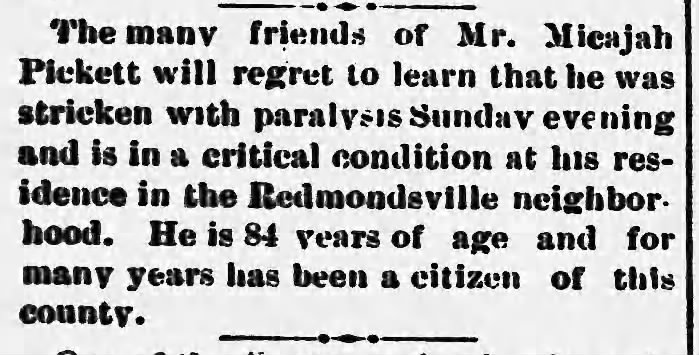
1897 Micajah Pickett, of Yazoo County, Mississippi, made his last will. The will was witnessed on May 11, 1897. The will was in probate court on May 2, 1898. The will mentioned the marriage contract with his wife; John K Pickett Jr (under age 21, but likely close to that age), son of John K Pickett and Louisa K Pickett; the family graveyard deeded to the state of Mississippi which is centered at the grave of his mother Mary; William R and Thomas K Pickett, sons of John K Pickett and Louisa K Pickett, who must relinquish all claims in their mothers estate to their sisters, daughters of their mother & father; Jane E Pickett, Mary G Pickett, Minnie R Pickett, Jennie B Pickett, and Eliza A Pickett, daughters of John K Pickett and Louisa K Pickett. William A Pickett was named executor. [34]
1898 M. Pickett, of Yazoo County, Mississippi, made his last will which was proved on May 3d, 1898. Letters testamentary were issued to W. A. Pickett. [35] [36]
1898 Micajah Pickett died on Apr 29 and was buried at Pickett Cemetery, Yazoo City, Yazoo County, Mississippi. [37] The stone reads:
Micajah Pickett born on Sicily Island Nov. 29 1812. Died Apr 29, 1898 aged 85 years and 5 months (illegible)
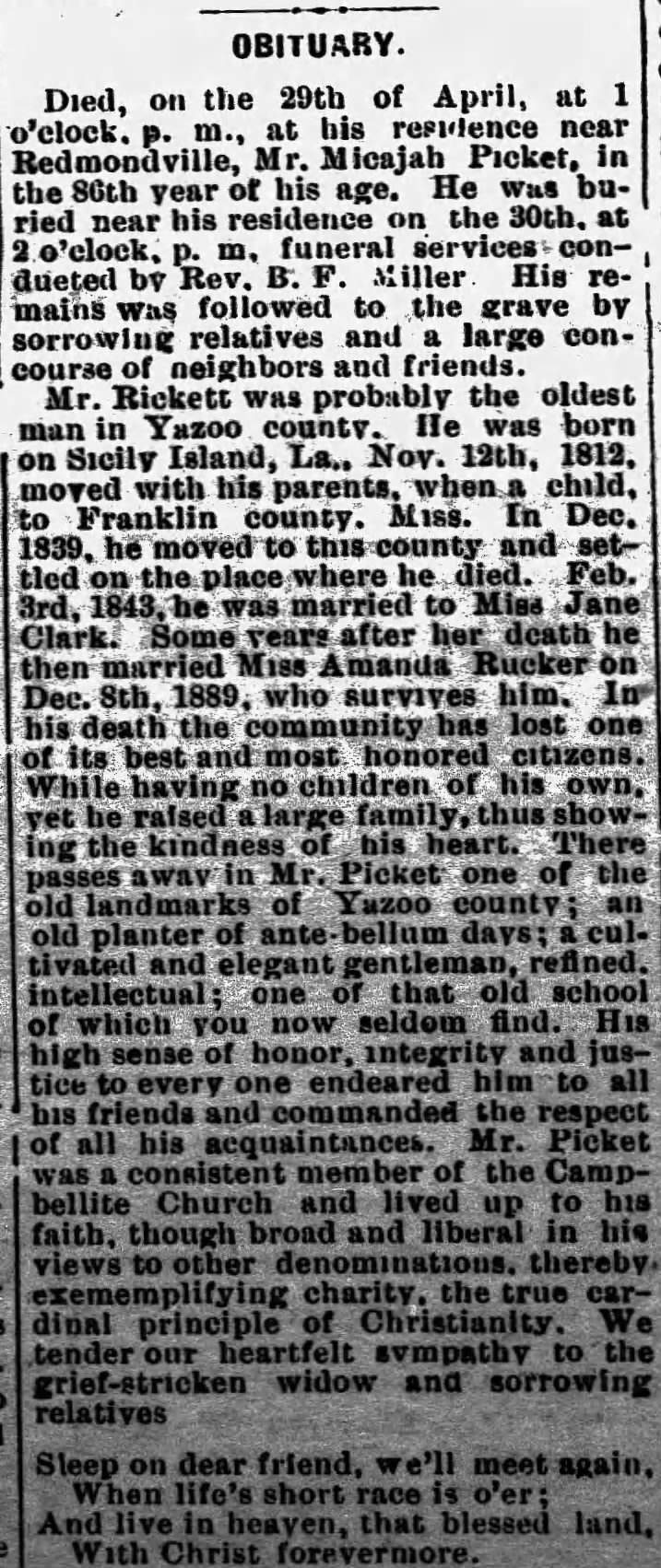
Died, on the 29th of April, at 1 o'clock, p. m., at his residence near Redmondville, Mr. Micajah Picket, in the 80th year of his age. He was buried near his residence on the 30th, at 3 o'clock, p. m, funeral services conducted bv Rev. B. F. Miller. His remains was followed to the grave by sorrowing relatives and a large concourse of neighbors and friends.
Mr. Pickett was probably the oldest man in Yazoo county, he was born on Sicily Island, La., Nov. 12th, 1812, moved with his parents, when a child, to Franklin county. Miss. In Dec. 1839, he moved to this county and settled on the place where he died. Feb. 3rd, 1843, he was married to Miss Jane Clark. Some years after her death he then married Miss Amanda Rucker on Dec. 8th. 1889. who survives him. In his death the community has lost one of its best, and most honored citizens. While having no children of his own, yet be raised a large family, thus showing the kindness of his heart. There passes away in Mr, Picket one of the old landmarks of Yazoo county; an old planter of ante-bellum days; a cultivated and elegant gentleman, refined, intellectual one of that old school of which you now seldom find. His high sense of honor, integrity and justice to every one endeared him to all his friends and commanded the respect of all his acquaintances. Mr. Picket was a consistent member of the Campbellite Church and lived up to his faith, though broad and liberal in his views to other denominations, thereby exememplifying charity, the true cardinal principle of Christianity. We tender our heartfelt svmpathv to the grief-stricken widow and sorrowing relatives.
Sleep on dear friend, we'll meet again.
When life's short race is o'er;
And live in heaven, that blessed land.
With Christ forevermore.
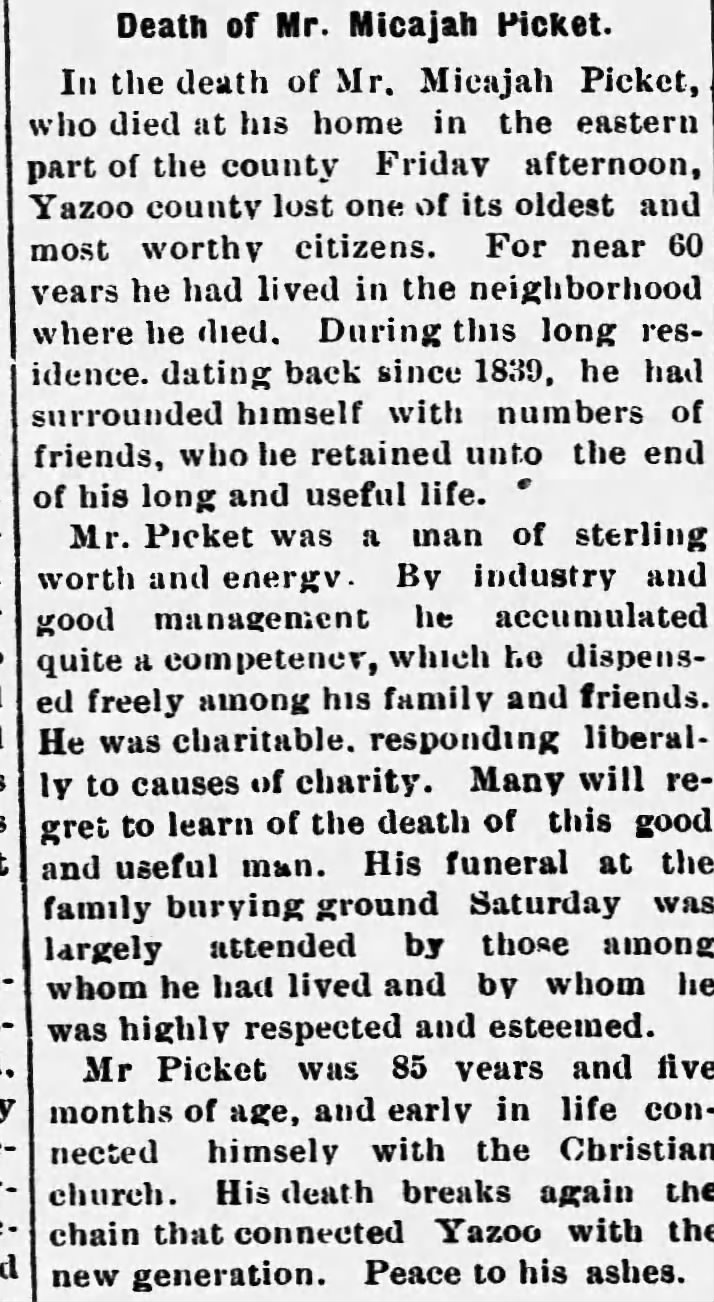
Death of Mr. Micajah Picket.
In the death of Mr. Micajah Picket, who died at his home in the eastern part of the county Friday afternoon [grave marker suggests the prior Friday], Yazoo county lost one of its oldest and most worthy citizens. For near 60 years he had lived in the neighborhood where he died. During this long residence, dating back since 1839, he had surrounded himself with numbers of friends, who he retained unto the end of his long and useful life.Mr. Picket was a man of sterling worth and energy. By industry and rood management he accumulated quite a competency, which he dispensed freely among his family and friends. He was charitable, responding liberally to causes of charity. Many will regret to learn of the death of this good and useful man. His funeral at the family burying ground Saturday was largely attended by those among whom he had lived and by whom he was highly respected and esteemed.
Mr Picket was 85 years and live months of age, and early in life connected himself with the Christian church. His death breaks again the chain that connected Yazoo with the new generation. Peace to his ashes.
A biosketch reports [42]:
M. Pickett, Redmondville, has for many years been identified with the history of Yazoo county, and the following space will be devoted to a brief sketch of his personal career. He was born in Sicily Island, La., November 29, 1812, and is the youngest in a family of nine children. His parents, William and Mary (King) Pickett, were natives of South Carolina. The family is descended from English ancestors, who emigrated to America and settled in Virginia. The father came with his family to Mississippi in 1807, making the journey by a flatboat down the Tennessee and Mississippi rivers to Franklin county; there he and his wife spent the remainder of their days with the exception of a few years passed in Sicily Island, La. Mr. Pickett, received his early education in the primitive log schoolhouse with a dirt floor and slab seats. At the age of fourteen years he was sent to Franklin, Tenn., and afterward to Danville, Ky., and finished his education at the University of Virginia. He then took up agriculture in Franklin county, Miss., which he continued until 1839. On Christmas eve of that year he arrived on the plantation which he has made his home since that time; it then covered nine hundred acres, the greater portion of which he opened to cultivation; he added to the first purchase until he owned at one time seven thousand acres. At the beginning of the Civil war he owned one hundred and ninety-six slaves, and livestock enough to carry on his farm. He raised meat and provisions for two hundred and twenty-five people, and milked as many as sixty-four cows. The plantation was one of the best improved in the county, and was carried on in the most systematic and approved manner. Eight hundred and thirty bales of cotton were produced annually, and fifteen thousand bushels of corn. Owing to ill health, Mr. Pickett was unable to enter the Confederate service. He now owns about twenty-five hundred acres of land. He was married at Jackson, Miss., in 1844, to Miss Jane E. Clark, a daughter of Gen. William and Louisa (Lanier) Clark. Mrs. Pickett was born in Pitt county, N. C. Two sons were born of this union, both of whom died in infancy. Mrs. Pickett was taken from this life in December, 1879. Ten years later, in the month of December, Mr. Pickett was again united in marriage to Miss Harriet Amanda Rucker, a daughter of Col. John W. Rucker, of Tennessee. He has always taken an active interest in the politics of his county. He is a member of the Christian church, while his wife belongs to the Baptist church. They are both people of unusual attainments, and of refined, cultivated tastes. Mr. Pickett is a widely traveled man, having visited almost every portion of the United States. He has witnessed the development of the South from the destruction of the war to its present advanced position, and takes a just pride in the courage of the Southern spirit.
Research Notes:
Micajah Pickett lived southeast of Yazoo, Mississippi. Redmondville (where Micajah died) is not shown on Google maps but Redmondville Road is south of Pickett Cemetery and east of Pickett Creek, which is a tributary to the Big Black River (where Micajah had a plantation in 1854). Big Black is west of Pearl River (see the 1888 land ownership map).
The notes above are for Micajah Pickett, son of William Pickett (son of Micajah Pickett and Kizanna Hinson) and Mary King. We have attempted to identify notes regarding this person. However, there were several other men named Micajah Pickett who may have been living in Mississippi and/or Louisiana at the same time. I would appreciate receiving clarification about distinguishing among these men, if you have information.
Micajah Pickett (1777-1847), spouse of Eliza Winn and Rodah King, son of Micajah Pickett and Kizanna Hinson.
This Micajah K. Pickett (1812-1898) noted above, son of William Pickett (son of Micajah Pickett and Kizanna Hinson) and Mary King.
Micajah K. Pickett (1765-1833) of Baton Rouge, Louisiana, son of Thomas Pickett (son of John Pickett and Mary Mess) and Nancy King.
Micajah K. Pickett (1789- after 1710), son of Charles Pickett (son of Thomas Pickett (son of John Pickett and Mary Mess)) and Selah King.
1816-1820 Micajah Pickett Senior (age 45+), Micajah Pickett Junior (age 26-45), and Micajah K Pickett (age 16-24) were all listed in the 1820 census for Franklin County, Mississippi, (Amite County, according to Ancestry.com). The margin is labeled as Franklin County, so Amite County is an error. 1816 Micajah Jr and Sr were named in an 1816 listing of Franklin County. I suspect that: Micajah Pickett Senior was a son of Thomas Pickett; Micajah K Pickett was a son of Thomas Pickett and Selah King; and that Micajah Pickett Junior (age 26-45) might be the spouse of Rodah King.
There were two, largely duplicative, records made for Micajah (Sr) Pickett:
1820 Micajah Pickett Senior lived in Franklin County, Mississippi in a household with free white males: 4 (under 10), 1 (10 thru 15), 1 (16 thru 18), 1 (16 thru 25), and 1 (45 and over); and free white females: 3 (10 thru 15) and 1 (26 thru 44); and 42 enslaved persons. [43] [44] John K Pickett (26 thru 44), perhaps a son of Charles Pickett, was listed nearby.
1820 Micajah Pickett lived in Franklin County, Mississippi. John K Pickett was listed nearby. [45]
Micajah K and Micajah Jr were listed on the same page as each other:
1820 Micajah K Pickett lived in Franklin County, Mississippi in a household with free white males: 1 (16 thru 25); and free white females: 1 (under 10) and 1 (16 thru 25); and 4 enslaved persons. The adjacent listing was for Thomas K Pickett (perhaps a brother of Micajah K Pickett). [46]
1820 Micajah Pickett Junior lived in Franklin County, Mississippi in a household with free white males: 1 (16 thru 25) and 1 (26 thru 44); and free white females: 1 (10 thru 15) and 1 (26 thru 44); and 16 enslaved persons. [47] [48]
[1] Biographical and Historical Memoirs of Mississippi, Vol. 2, (Chicago: 1891), 597, [GoogleBooks].
[2] Find A Grave Memorial 5693849, [FindAGrave].
[3] Edmund Ruffin, ed., The Farmers' Register, Vol. 1 (Shellbanks, Virginia: 1834), 191, [HathiTrust].
[4] Edmund Ruffin, Farmer's Register a monthly publication devoted to the improvement of the practice...agriculture, Vol. II (1835), 252, [GoogleBooks].
[5] Biographical and historical memoirs of northwest Louisiana (1890), 657, [HathiTrust].
[6] Mississippi, State and Territorial Census Collection, 1792-1866, [AncestryRecord], [AncestryImage].
[7] Mississippi, U.S., Compiled Census and Census Substitutes Index, 1805-1890, [AncestryRecord].
[8] Mississippi Free Trader, Natchez, Mississippi, February 7, 1844, page 3, [NewspapersClip].
[9] Timothy B. Smith, Mississippi in the Civil War: the home front (1974), 169, [GoogleBooks].
[10] Mississippi, Holmes County, Land records, 1824-1959; indexes, 1832-1903, 1824-1959, I-180, [FamilySearchImage].
[11] The Weekly Mississippian, Jackson, Mississippi, December 8, 1848, page 4, [NewspapersClip].
[12] United States Federal Census, 1850, [AncestryImage], [AncestryRecord].
[13] 1850 U.S. Federal Census - Slave Schedules, [AncestryImage], [AncestryRecord].
[14] The Yazoo Democrat, Yazoo City, Mississippi, August 6, 1851, page 3, [NewspapersClip].
[15] The Yazoo Democrat, Yazoo City, Mississippi, May 11, 1853, page 4, [NewspapersClip].
[16] The Weekly American Banner, Yazoo City, Mississippi, May 12, 1854, page 2, [NewspapersClip].
[17] The Yazoo Herald, Yazoo City, Mississippi, August 18, 1899, page 3, [NewspapersClip].
[18] Mississippi, U.S., Newspapers.com™ Stories and Events Index, 1800's-current, [AncestryRecord].
[19] The Yazoo Democrat, Yazoo City, Mississippi, May 17, 1854, page 2, [NewspapersClip].
[20] The Weekly American Banner, Yazoo City, Mississippi, June 6, 1856, page 1, [NewspapersClip].
[21] United States Federal Census, 1860, [AncestryImage], [AncestryRecord].
[22] Confederate Applications for Presidential Pardons, 1865-1867, [AncestryImage], [AncestryRecord].
[23] Confederate Applications for Presidential Pardons, 1865-1867, [AncestryImage], [AncestryRecord].
[24] Executive Documents of the House of Representatives, 1867 (1868), 78, [HathiTrust].
[25] United States Federal Census, 1870, [AncestryImage], [AncestryRecord].
[26] The Clarion-Ledger, Jackson, Mississippi, December 10, 1879, page 3, [NewspapersClip].
[27] The Clarion-Ledger, Jackson, Mississippi, Dec 10, 1879, page 3, [NewspapersClip].
[28] Find A Grave Memorial 5693879, [FindAGrave].
[29] Find A Grave Memorial at Ancestry.com, [AncestryRecord].
[30] United States Federal Census, 1880, [AncestryImage], [AncestryRecord].
[31] U.S., Indexed Early Land Ownership and Township Plats, 1785-1898, [AncestryRecord], [AncestryImage].
[32] FamilySearch.org, [FamilySearchRecord].
[33] The Yazoo Herald, Yazoo City, Mississippi, August 28, 1896, page 3, [NewspapersClip].
[34] Mississippi, U.S., Wills and Probate Records, 1780-1982, Yazoo County, Mississippi, Will B-361, [AncestryRecord], [AncestryImage].
[35] Mississippi, U.S., Wills and Probate Records, 1780-1982, [AncestryRecord], [AncestryImage].
[36] Probate records (Yazoo County, Mississippi), 1833-1948, [FamilySearchImage].
[37] Find A Grave Memorial 5693849, [FindAGrave].
[38] The Yazoo Herald, Yazoo City, Mississippi, May 6, 1898, page 3, [NewspapersClip].
[39] U.S., Newspapers.com Obituary Index, 1800s-current, [AncestryRecord].
[40] The Yazoo Herald, Yazoo City, Mississippi, May 6, 1898, page 3, [NewspapersClip].
[41] U.S., Newspapers.com Obituary Index, 1800s-current, [AncestryRecord].
[42] Biographical and Historical Memoirs of Mississippi, Vol. 2, (Chicago: 1891), 597, [GoogleBooks].
[43] Dunbar Rowland, The Official and Statistical Register of the State of Mississippi, Volume 4 (1917), 97, 1816 top right column, [GoogleBooks].
[44] United States Federal Census, 1820, [AncestryImage], [AncestryRecord].
[45] Mississippi, State and Territorial Census Collection, 1792-1866, [AncestryRecord], [AncestryImage].
[46] United States Federal Census, 1820, [AncestryImage], [AncestryRecord].
[47] United States Federal Census, 1820, [AncestryImage], [AncestryRecord].
[48] Dunbar Rowland, The Official and Statistical Register of the State of Mississippi, Volume 4 (1917), 97, 1816, near bottom left column. William and Thomas K Pickett were named in the right column, [GoogleBooks].